Meet Izzul Irfan and Erika Poh, both 20. They are respectively the Creative Director and Music Director of The Runaway Company, a youth-led organisation offering young people a platform to showcase their passion for the performing arts. Founded in 2018, TRC has to-date staged three major productions and is gearing up for a major show in 2020. Izzul and Erika tell ESTHER TAN how a shared love for music, theatre and storytelling has inspired them to combine all three elements into a unique brand of music theatre.
How would you best describe what The Runaway Company stands for?
Izzul: TRC is a youth theatre company that integrates music and theatre to tell stories. It is a space for young people to come together, create and grow as a community.
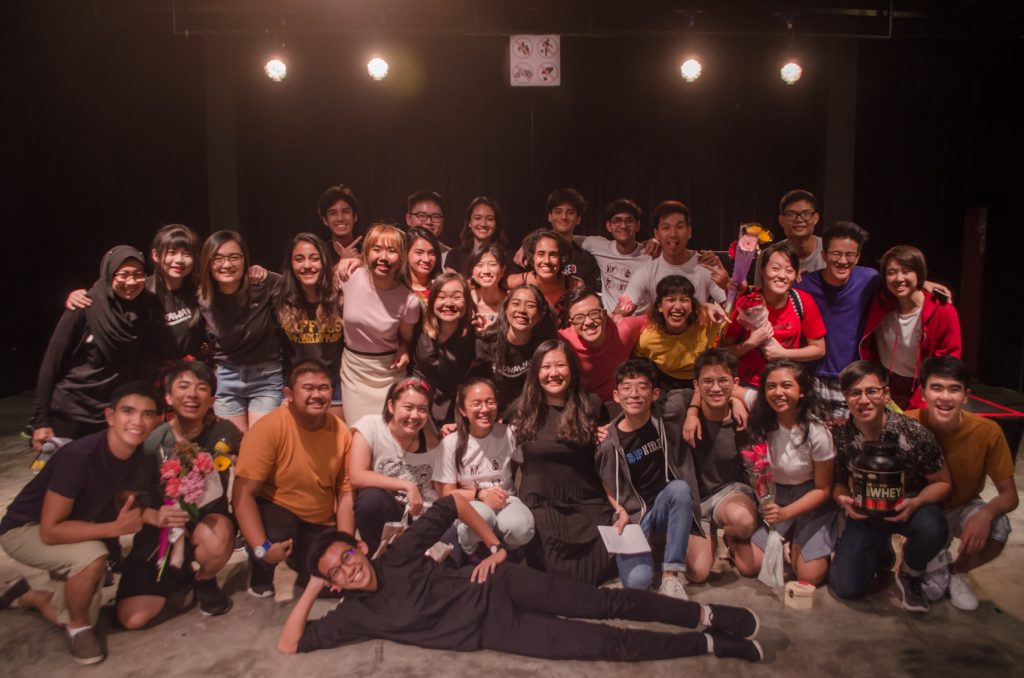
The cast of Void Deck, 2019.
Have you always been involved in the performing arts?
Erika: Yes. After finishing junior college, I chose to take a gap year to pursue music and theatre. In 2018, I did six theatre and music projects, some of which I’m still currently involved in. Going forward, I want to put my major focus in composing music.
Izzul: Though I’m presently still doing my National Service, I’ve always been active in theatre. This year alone, I’ve been involved in four productions, including The Runaway Company’s Void Deck, where I was both director and scriptwriter. I’ve also done some acting: I was in Uncut with the M1 Singapore Fringe Festival, and did a show with Young & W!ld, a division of W!LD RICE. Most recently, I directed Wilderness, TRC’s latest production.
Walk us through what it means to use music to tell a story.
Izzul: What we do at TRC is more music theatre than musical theatre. When you think of the latter, large-scale productions like Les Miserables and Wicked come to mind. The former, however, is about using music as a potent storytelling device in theatre. With music theatre, one can incorporate music into a straight play and transform it into something totally different. Personally, I was inspired by the UK’s National Theatre production of Jane Eyre, which weaved music beautifully into its storytelling. I was also impacted by The Necessary Stage’s Rosnah—that was the first time I saw music being used in such a visceral way to portray characters’ emotions.
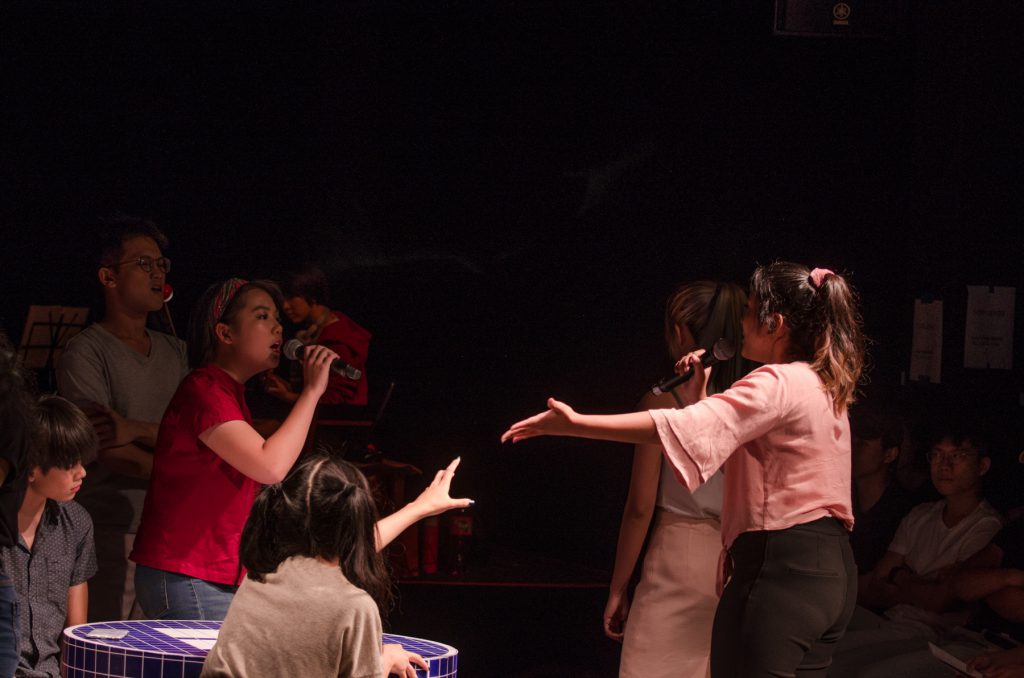
The Runaway Company members in their 2019 production, Void Deck.
How did you come up with “The Runaway Company” as a name?
Erika: The musical that we staged before we starting this company was entitled Runaway. That was a good experience, so we decided to name the organisation after it.
Why did you choose to start a company that is entirely youth-led?
Izzul: This wasn’t intentional. We just happened to be a group of young people who are very passionate about integrating theatre and music, and wanted to foster a community of like-minded peers. But we also see the great value in being youth-led—there aren’t many companies out there that are run by a very young team and that let young people tell their own stories. At the end of the day, TRC is a safe space for young artists to dabble in music- and theatre-making—to try, experiment, and also to fail. It’s important to make the mistakes, so as to learn and grow from them. Here they have the autonomy and ownership over their works, and they can produce something that is truly theirs.
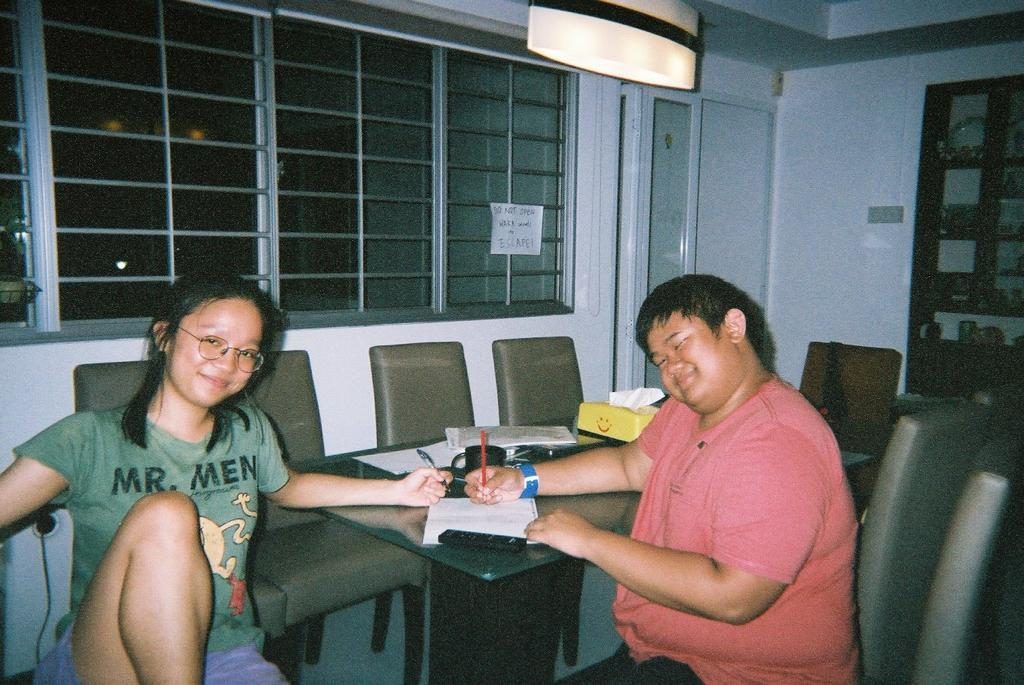
Erika and Izzul penning their first original musical, Runaway, in 2018.
How young are your members?
Izzul: We are between 18 and 30 years of age.
Tell us how music and theatre work in harmony to tell a good story?
Erika: Theatre is very malleable: it’s fun, vibrant and can convey stories in a very accessible way, such that people can easily understand or feel a connection. Music is less tangible, but has the ability to evoke a range of emotions that theatre cannot otherwise express in terms of words and actions. Combining them both has the most potent effect.
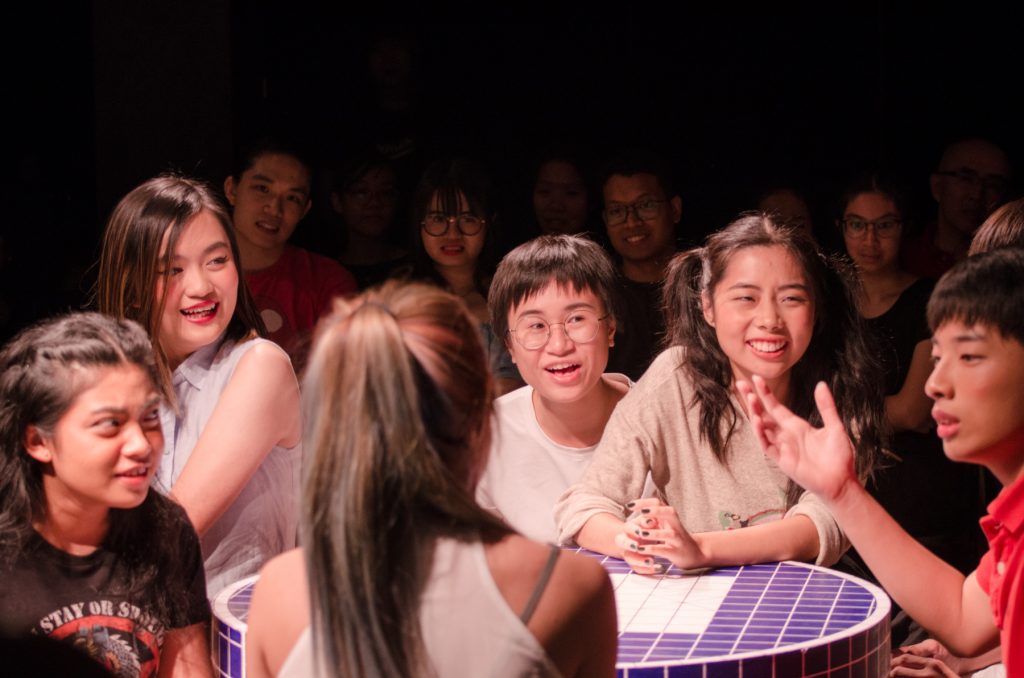
Cat, Jia Wei’s friend, disrupting Block-182’s reunion in Void Deck.
You mentioned that TRC lets young people’s stories and voices be heard. Do you feel youth narratives deserve more attention?
Izzul: Yes. If young people don’t tell the stories for themselves, who else will? It’s therefore important to give both the space and opportunity for the youth to create, own and tell their stories. How many times have we read stories about young people (not written by young people) that attribute most experiences to teen angst? It’s time the youth owned their narrative.
Erika: It’s a journey worth paying attention to. The youth years may be volatile, but it’s a time when people start to figure out who they are as individuals.
Where is TRC based? Do you have an office premises or studio?
Izzul: Not at the moment. There are very few theatre spaces in Singapore and they are expensive, too. This is an issue many young arts groups struggle with. At some point, we do hope to be able to afford a semi-permanent space where we can create theatre. Erika: As a result, we’ve learned not to take space and money for granted. When we first started The Runaway Company, we were rehearsing in a very small office space at Peninsula Plaza. It was a challenge to fit an entire 13-piece orchestra there.
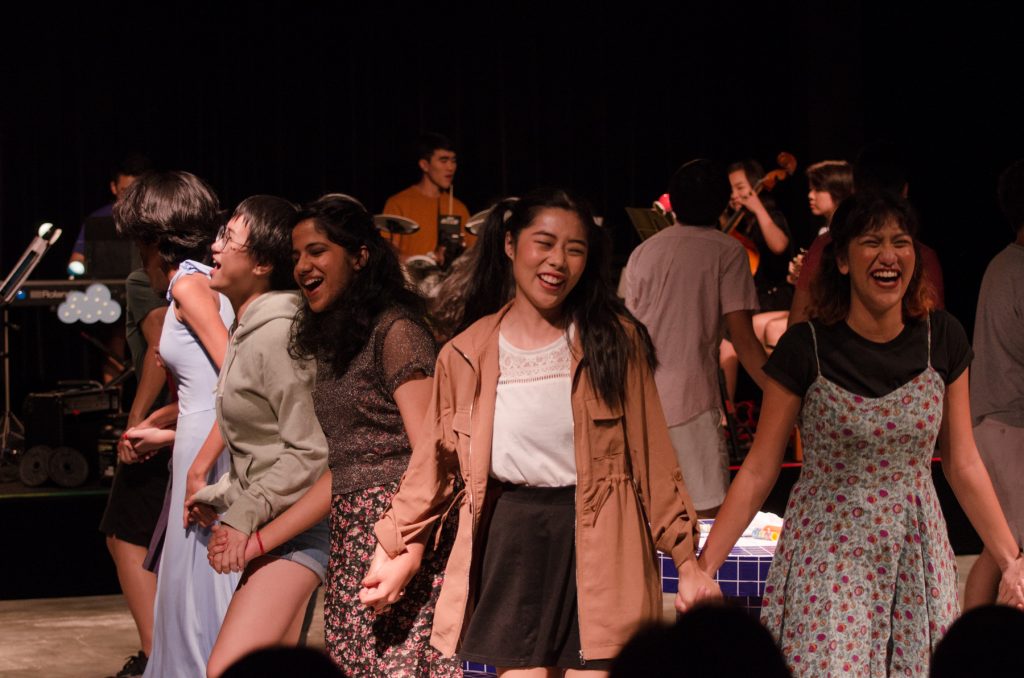
The ensemble of Void Deck singing “Thank You for The Music”.
Where do you source your actors from?
Erika: We do open calls, auditions and interviews, in addition to inquiring within our immediate social circles. Also, we do a fair but of multitasking; for instance, actors don’t only just act, and crew members aren’t just “crewing”—everyone is involved in various aspects of production.
On that note, if someone is interested to join TRC, do they need to have any prior experience in singing, acting or music?
Izzul: In general, experience in acting, performing or singing is not a must. We can provide aspiring performers with the platform, training and exposure.
Erika: Not everyone who joins has to be a performer. If your strengths are in other areas, such as costume design, lights, sets and so on, you’re welcome to apply to work in those departments. As for music performers, you don’t need to be a professional musician, but we're interested in people who already have music-making skills.
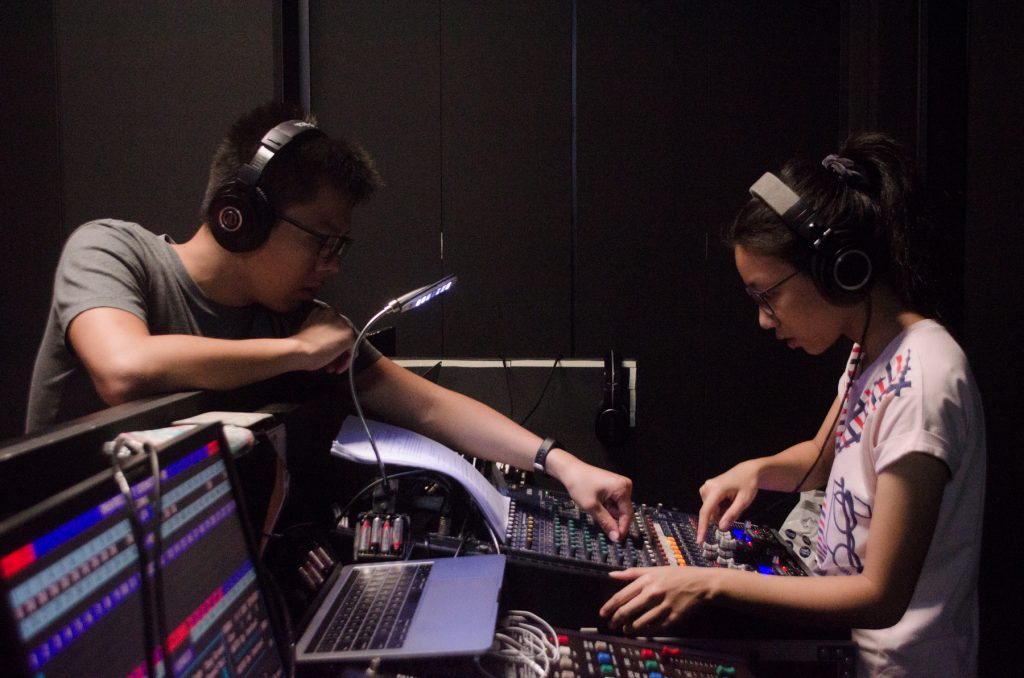
The Runaway Company’s sound crew hard at work.
In your opinion, can anybody sing or act?
Erika: Yes, I really believe so. Most people think you need to have the talent to sing and act, but I feel that talent is where you start. As long as you put in the hours, determination and commitment to the learning process, you can master anything.
Izzul: Talent is only one aspect, and you can only go so far with talent alone. I didn’t do music at all when I was younger, so I had a lot of catching up to do once I began working with Erika. Now, after much effort, I have learned enough about music to help me tie it in with theatre.
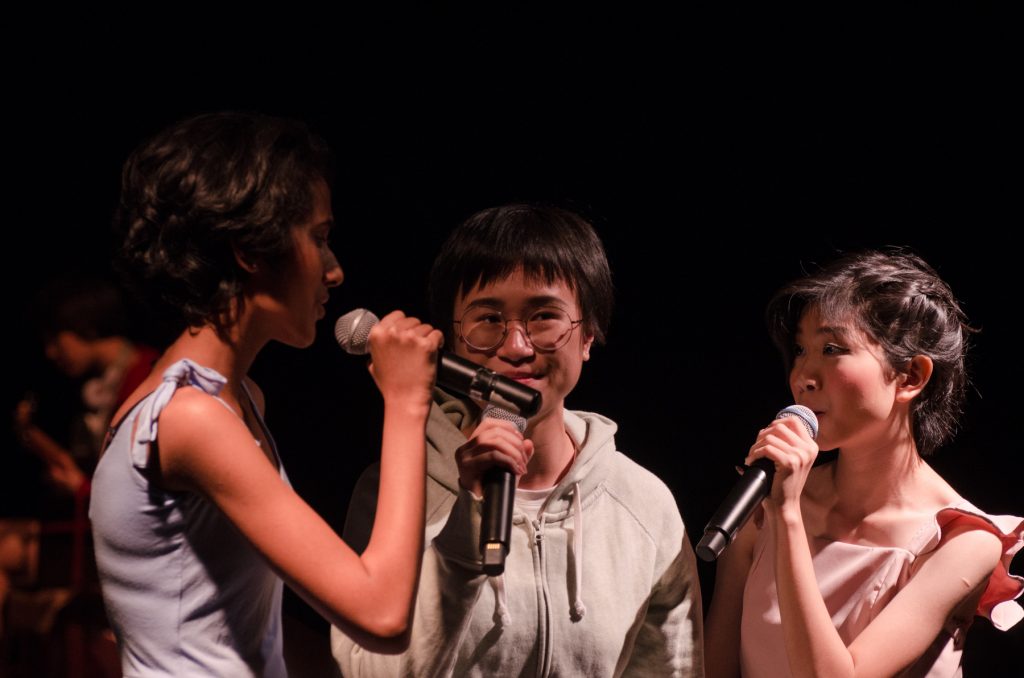
Sarah dreams of simpler times in “Soft Place to Land”.
How do you finance your productions?
Izzul: Unlike full-time theatre companies, TRC doesn’t have operating costs, so the bulk of our money goes into the two productions we do every year. Our three main sources of revenue are grants, ticketing and donations. All year round, we apply for grants from organisations looking to support young artists: to date, we’ve received funding from the National Youth Council and National Arts Council, and the money helps to offset initial costs such as the renting of rehearsal and performance venues. Ticket sales are also essential to cover the cost of production: stuff like props, sets, etc. Finally, we’re very grateful to our donors for their generosity and support.
Erika: Samuel, our producer and treasurer, helps us to apply for grants, secure funding, and diversify our financial streams. We’re careful with our finances, and want to use it as efficiently as possible so that no money is wasted.
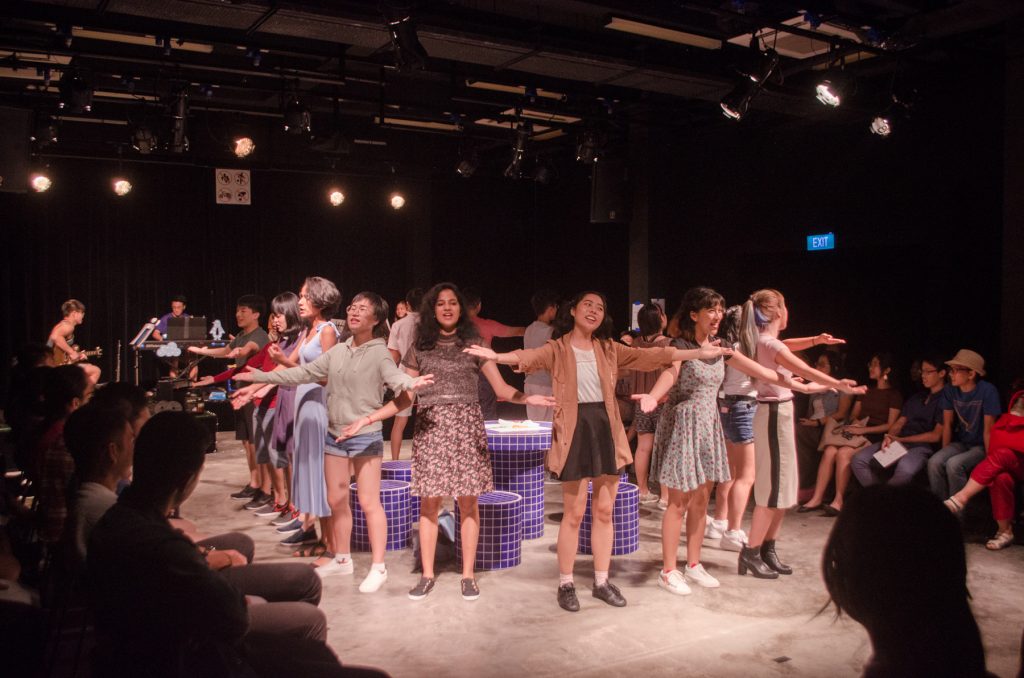
The cast of Void Deck performing the final song “Thank You for the Music”.
TRC’s productions have youth-centred themes. What’s an important issue facing young people today?
Izzul: Mental health/illness is one such topic: though it’s more talked about these days, there's still a lot of resistance and stigma attached to the issue. As such, we staged Wilderness to examine this subject more deeply. Making art is about creating a future that you want to see happen, because nobody should take for granted that the world is going to be great in the next 10 or 20 years.
How have your works impacted your audience and cast members? Can you share any memorable occasions in which they shared feedback with you?
Erika: When a few cast members came up to me and said that my original songs in 2018’s Runaway the Musical really resonated with them, that was when I first felt like my work meant something more. Runaway tells the story of a girl who wanted to escape from her problems, but who eventually decided to stay and face them bravely. This struggle is something most people can relate to, especially young people transitioning into adulthood.
Izzul: Void Deck, staged earlier this year, really left an impression on Man Lin, one of our executive committee members. Void Deck is about six friends who’ve not met up since secondary school but who gather for a reunion at the void deck where they used to hang out and play music. After watching the performance, Man Lin invited some of her old friends to spend time at the actual void deck they themselves used to hang out at. I thought that was so special, because it was one of those “life imitates art, art imitates life” moments.
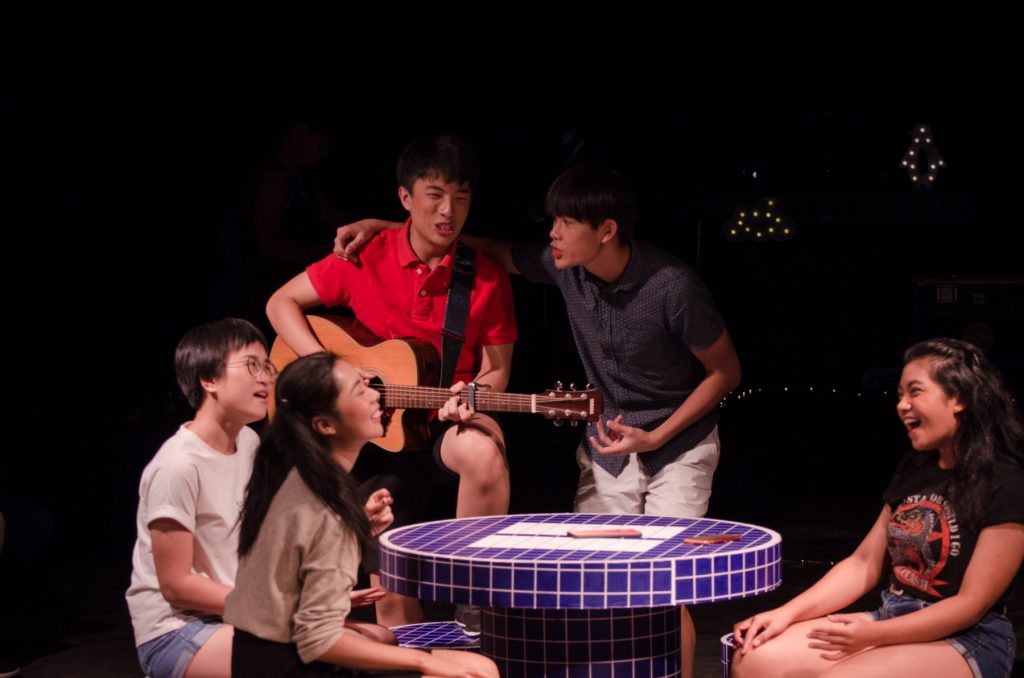
An awkward first meeting at the void deck for Block-182.
The arts is a powerful communicator. For instance, if you listen to music, and it makes you feel better or has affected your worldview in some way, it has already enhanced your life. Art (in its many forms) has the ability to transport the viewer or listener into another world, cleanse their palate, reset their imagination, and help them see things through a new lens.
Who or what are some of your theatrical or musical influences?
Erika: I like singer Barbra Streisand, classical composer Igor Stravinsky, musical group Earth, Wind and Fire, and composer Julia Wolfe.
Izzul: Productions-wise, Rosnah and Off Centre —both by The Necessary Stage—told their stories effectively and left a lasting impression on me. In terms of personalities, my theatre idols are Haresh Sharma (playwright), Alvin Tan (director) and Siti Khalijah (actress). They are all such amazing and skilful storytellers. Sharma is an amazing writer, especially in the Singapore theatre canon—his characters are always well fleshed out and “scarily real”. Tan is a visionary in his directing and the work he devises. As for Siti, her ability to portray vulnerability onstage is unmatched in Singapore theatre.
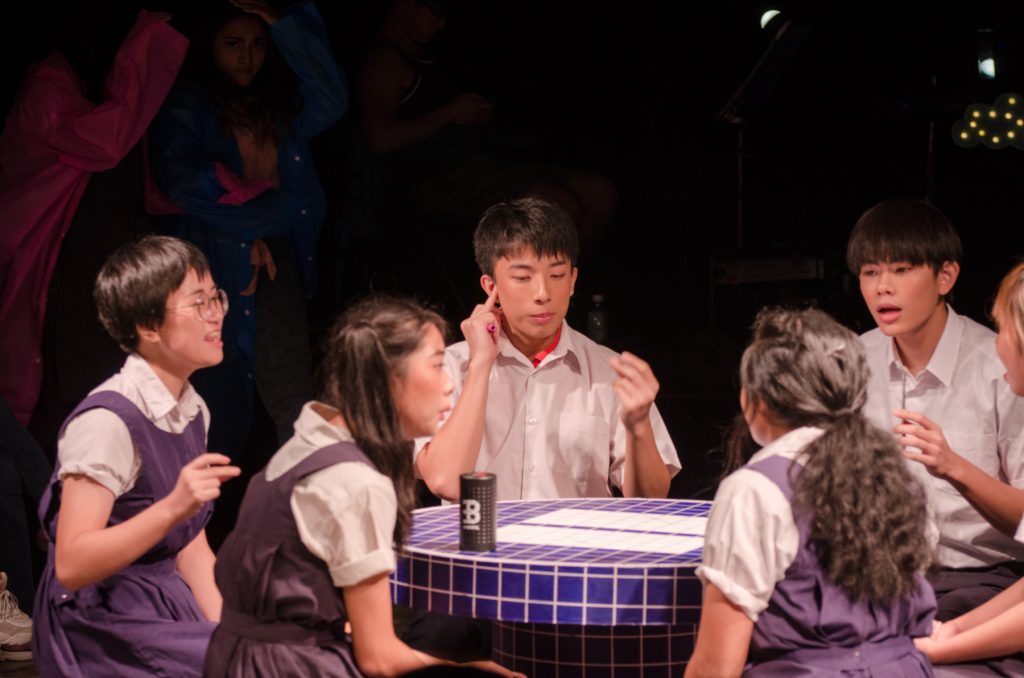
Block-182 doing what they do best: jamming to a medley of their favourite pop songs.
What’s a favourite role you’ve played or a song you’ve enjoyed writing or performing?
Erika: I enjoyed writing “Runaway Girl” for Runaway the Musical. When I first composed the melody, I was in my school’s music room with a friend. He was playing on the piano and I just started singing to his chords and together we came up with the chorus. There weren’t lyrics to this song until about two years later when I gave it to Izzul to pen the lyrics. When he showed me the words to this piece of music, it finally made sense. Izzul: I enjoyed the experience of directing my school’s drama club production, Where To Find. We experimented with many new things, such as making sounds with a mortar and pestle, and incorporating percussion with theatre.
Where do you see The Runaway Company in the next five to ten years? Erika:
The aim is for somebody to succeed us and continue our dream if/when we aren’t able to do it anymore. I hope TRC will continue to be a platform for like-minded people to come together to do music and theatre.
Izzul: Additionally, we aspire to improve and constantly stage good-quality productions. Youth theatre sometimes gets a bad rep for being “too abstract” or lacking in substance, so we want to challenge that narrative by putting out great work. In five to ten years, we will hopefully have more financial stability. If there comes a day when we can actually create productions without worrying too much about money or doubting ourselves, that would be ideal. And as Erika mentions, succession is an important issue, though we acknowledge the difficulty of finding the right people to take over; people who share our creative vision. Ultimately we hope TRC can be an institution that constantly renews itself with new members who are excited to make theatre.
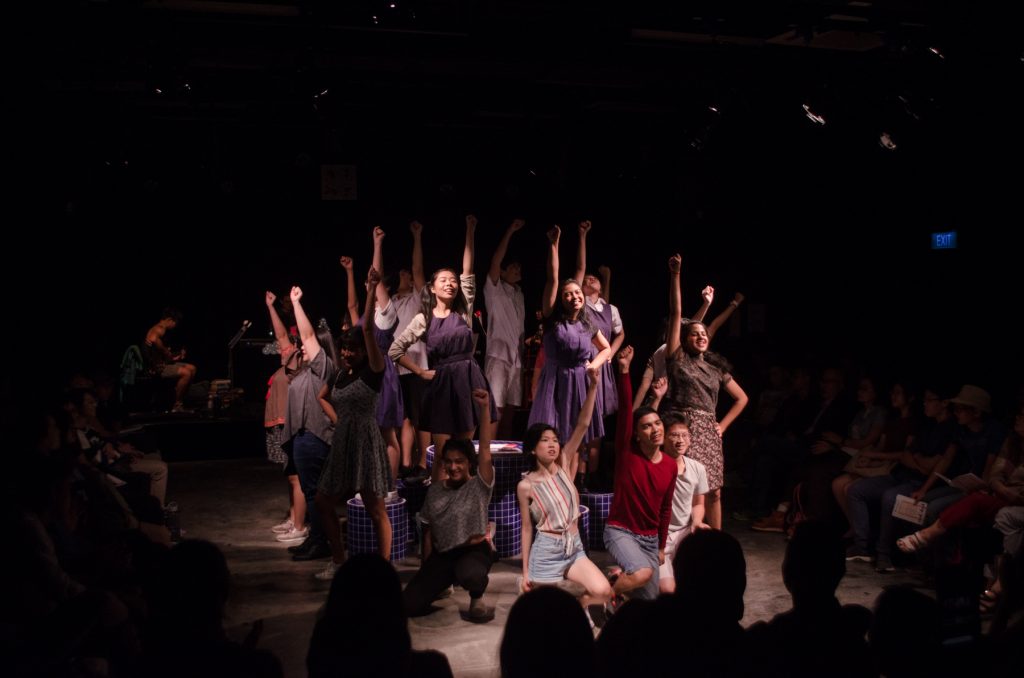
The cast of Void Deck striking the final pose for "Don’t Stop Believing".
*This article has been adapted from a video interview with Izzul and Erika. Watch all three parts here.
 |
Esther Tan was a 2019 Summer Associate (Editorial) at the Lien Centre for Social Innovation. She is a rising sophomore from the Faculty of Arts and Social Sciences at the National University of Singapore, with a double major in English Language and Japanese Studies. As someone who believes that words are the strongest weapon one can wield, she is deeply interested in how language and culture shape us as individuals. In her free time, she enjoys translating her favourite articles from Japanese to English. She can be reached at hello@socialspacemag.org |




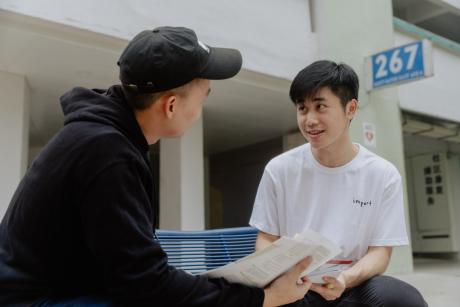



Comments